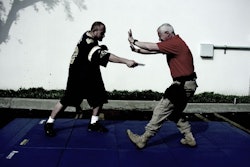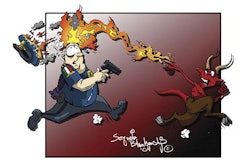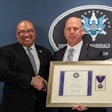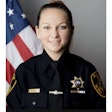Private security is one of this country’s biggest growth industries, bringing in billions of dollars every year and ranking as one of the fastest growing sectors in the global economy. In the last decade it accounted for the largest number of new jobs; it has grown so fast that security officers now outnumber police officers 3 to 1.
Those numbers would be disturbing were it not for a concerted effort on the part of the private security industry to improve its level of professionalism. It has been a long, slow process.
Over the past 20 years, states have begun to mandate minimum training standards, background checks, and pushed for the ability to conduct federal criminal history checks. This effort has been led by the American Society for Industrial Security International, and the National Association of Security Companies, with support from the International Association of Chiefs of Police and its Private Sector Liaison Committee.
Like the profession, the relationship between police and private security is also improving. Admittedly, the image of the lowly security guard in an ill-fitting uniform still prevails in some areas, as does the reality that security guards are often underpaid, untrained, and unmotivated. But there are a number of departments that recognize the role private security can play in public safety.
The Pasadena (Calif.) Police Department has long recognized the importance of its partnership with private security. The Department routinely works with a large security company to coordinate crowd control and keep the Pasadena Rose Bowl safe for the annual Rose Bowl Game and the many other events that take place there.
“Private security has a role to play that the police can’t fill,” says Pasadena’s Lt. Rick Aversano. “We don’t do the watchman stuff—the access control, bag searches, perimeter security—because we don’t have the resources. We typically have a very good relationship with security because we both want the same thing, and that is a safe event.”
Policing Sin City
The Las Vegas Metropolitan Police Department has the same attitude toward the 7,500 security personnel and 1,000 surveillance specialists who work in the city’s hotels. The department’s Tourist Safety Unit (TSU) started in 1995 to address tourist-related crime with a “one-stop shop” for tourist victims.
Instead of sending them from one division to another, the TSU coordinates the department’s response to each crime. It accepts hotel security reports on the victim’s behalf and, as a courtesy, will send them to the victim’s insurance company if necessary. By early next year, the courthouse will be wired so that felony victims who live out of state can testify via closed-circuit television over the Internet.
The Tourist Safety Unit’s teams of detectives go after pickpockets, check forgers, and other criminals. Each officer is assigned anywhere from five to 12 hotels, and works directly with hotel security directors, investigators, and security personnel. Their relationship is surprisingly symbiotic.
For example, detectives might follow a pickpocket into a hotel and remain in contact with the hotel security while “the eye” keeps the suspect under surveillance until security personnel detain him. Or police may set up a sting on a maid suspected of stealing to keep the hotel from having to handle the problem. In emergencies, a high-speed fax system lets police send alerts to 100 hotels in less than three minutes, effectively harnessing hotel security as an additional resource.
The department helps train hotel security personnel, and often sets up specialized training in response to crime trends, like a wave of check forgeries or credit card fraud cases. In addition to LVMPD training, Las Vegas hotels require security personnel to undergo training in such areas as report writing, detection, use of force, and relevant legal issues.
“The caliber of these people is really amazing,” says Sgt. Tim Shalhoob, a TSU supervisor. “They know what they’re doing. They know their authority and the limits of their authority. Quite frankly, the hotels pick the best of the crop. We really rely on them and they rely on us.”
Shalhoob says the department has gone out of its way to break down barriers between police and security officers, not only through cooperative training classes but also by encouraging detectives to give security personnel their home phone numbers, and by not allowing them to accept “comp” meals from the hotel.
“If police officers eat in the restaurant, the security officers can’t go with them because it’s off limits,” says Shalhoob. “So we tell our detectives that if they want to have a meal at the hotel, they can eat where the other employees eat. It doesn’t compromise our integrity and it sure has broken the ice.”
These relationships are maintained at monthly meetings of the Las Vegas Security Chiefs Association, where LVMPD representatives and personnel from 90 hotels meet regularly to discuss training issues, crime trends, and security problems. It is interesting to note that the 7,500 security officers employed by the city’s hotels have even become a rich resource of new recruits for the police department.
Securing Florida’s Theme Parks
The Orange County (Fla.) Sheriff’s Office, which polices Orlando’s theme parks and the hotels, restaurants, and tourist-oriented businesses along its famed International Drive, is yet another agency that has built a relationship with its local private security community.
The OCSO’s specialized effort started in the early '90s, and was so successful at addressing tourist-related crime and creating partnerships with local security personnel that the department restructured its jurisdiction from four sectors to five, with the fifth being a specialized tourist division.
Sector 5 now numbers 75 officers, says Capt. Ted Brown, the Sector 5 supervisor. “We’ve broken down a lot of barriers so we have a better understanding of the security officers’ job and the battles they face every day, and they have a better understanding of our jobs and of police procedure. Our goal is to partner with them to help solve their problems because if it’s a problem for them, it’s eventually going to be a problem for us.”
Sector 5 takes a unique, nontraditional approach to law enforcement. It assigns two people as community service officers, whose job is to visit area businesses and help them create a more secure environment. Discussions typically focus on crime prevention from a police standpoint.
Patrol officers are encouraged to visit area businesses and, in particular, to create relationships with security personnel. These relationships are such that deputies often keep security directors and staff contacts on their Nextel mobile telephone “direct connect.”
“It’s strictly voluntary,” Brown says, “and not all the officers do it. But for those who do, it supports our partnership with the community and helps the business owners understand that the police are part of that community. They realize that just because one of our officers is in their business doesn’t mean something is wrong.”
Sector 5 officers make use of a crime fax system that lets them warn businesses about recent crimes. They also attend a monthly meeting with security directors and investigators from local hotels, businesses, and theme parks.
“We might talk about a trend we’re seeing, or we might pass around information about, say, a hotel employee we arrested for stealing,” Brown says. “Unless we pass the information on, this person is just going to go down the street to another hotel and start doing the same thing again. These meetings put us all on the same team and working toward the same goal, which is a safe environment for our visitors.”
Fred Prassack, security director for the Peabody Hotel in Orlando, lauds the Orange County Sheriff’s Office for its ability to create cooperative partnerships. “You’re a fool if you don’t go to these meetings because the people who commit crimes here are opportunists,” says Prassack, a retired police officer from Ohio. “They come here for the very reason of committing crime. They know that if they’re caught, the victim is a tourist and is not likely to come back to Orlando to testify against them. These monthly meetings, the crime fax, and the partnership we have with the sheriff’s department and the deputies are probably the only reasons we’ve been able to catch a lot of these people.”
Ed Ferreira, security director for the Rosen Plaza Hotel in Orlando, is another Sector 5 fan. “I can’t say enough good things about them. We recently had an employee get her purse snatched in front of the hotel. One of our security officers had a Nextel and radioed a sergeant. While our officer was chasing the bad guy, he was also communicating with the sergeant over his Nextel radio. They ran the guy straight into a responding unit.”
Trusting the Eyes and Ears
One of the most important aspects of the relationship between public safety and private security is a clear understanding of the role private security plays. Their job is not to catch bad guys but to provide a uniformed presence and alert authorities when a crime occurs, acting as law enforcement’s eyes and ears.
“We’re the ones who are familiar with the property,” Ferreira says. “We’re the ones to direct police where they have to go and communicate what it was that caused our suspicion.”
Yet it is exactly this kind of familiarity that concerns law enforcement. Security personnel for a hotel know where every back door is located, the configuration of the ventilation system, and the location of every weak link and escape route. As police begin to view the world less in terms of locations and more in terms of possible terrorist targets, the very idea of a minimum wage employee with unlimited access is unsettling.
There is more than one reason for this uneasiness. As an industry, private security has no federal government oversight. There are no federally mandated minimum training standards, and no uniformity among the state laws that require training for private security officers. In fact, 10 states do not require background checks, either at the state or federal level, nor do they regulate the profession.
Many security personnel are not highly compensated for their jobs, so it’s not unreasonable to worry that they might either not devote the necessary attention to their jobs or use their familiarity with the tourist industry to become involved in an illegal scheme that could make them some extra money.
According to 2000 statistics, the average salary for a private security guard was less than $20,000. Many get no health insurance, paid vacation, or sick days. Private security is also often a second job, one that most leave within months, making it difficult to track former employees.
There are more than 11,000 private security firms in the U.S., with the federal government being one of its biggest customers. The industry will continue to grow as concerns about terrorism increase; the Labor Department has predicted it will grow faster than all other occupations through 2010. Yet even with a skyrocketing demand for increased security, a bill to authorize federal background checks has taken more than a decade to get within striking distance of Congressional approval.
“This legislation has been in the pipeline for more than 12 years,” says Gail Simonton, executive director and general counsel for the National Association of Security Companies. “It only authorizes us as employers to obtain an FBI fingerprint-based check, which is the one thing we can’t do on our own. Without an FBI criminal history check, we would have to check the local records in every city and county. And we still wouldn’t be sure whether the person whose name we’re checking is in fact the person we want to hire.”
Simonton says she hopes the bill, which unanimously passed the U.S. Senate and is currently being considered by the House of Representatives, will be approved by the end of the year.
Passage of the bill could go a long way toward encouraging partnerships between public safety and private security. According to Charles Connolly, former assistant commissioner of the New York City Police Department and currently vice president in charge of security for Merrill Lynch Corp., those partnerships will play an important role in homeland security. “Given that today’s battlefront is on America’s homeland, the police are the frontline troops in this war. However, they are not alone in this effort, as private security assumes a greater role in safety, prevention, and preventing the misuse of proprietary assets,” Connolly told the Major Cities Chiefs Association and the Major County Sheriff’s Association’s annual conference last year. “That is the challenge for private security as well as the law enforcement community. … Domestically we must further explore what partnership potential exists. What role does or can police leadership play in recognizing, recruiting, and developing police-private security initiatives?”
Dep. Craig Dorris, who works the Orange County Sheriff’s Office Homeland Security Section, believes that a productive partnership will require education and cooperation if private security is going to be another set of eyes and ears for law enforcement.
“When we created this unit, part of our charge was to design a homeland security protection program. That meant we had to train our local security people in what we want and what they needed to be looking for. We wanted them out there and acting as agents for us. We need to train them. Get them on our side. Show them how important they are to the overall crime prevention and counter-terrorism picture. Private security is a huge asset, and one that we can’t afford to let lay out there. We need to put them to work.”












